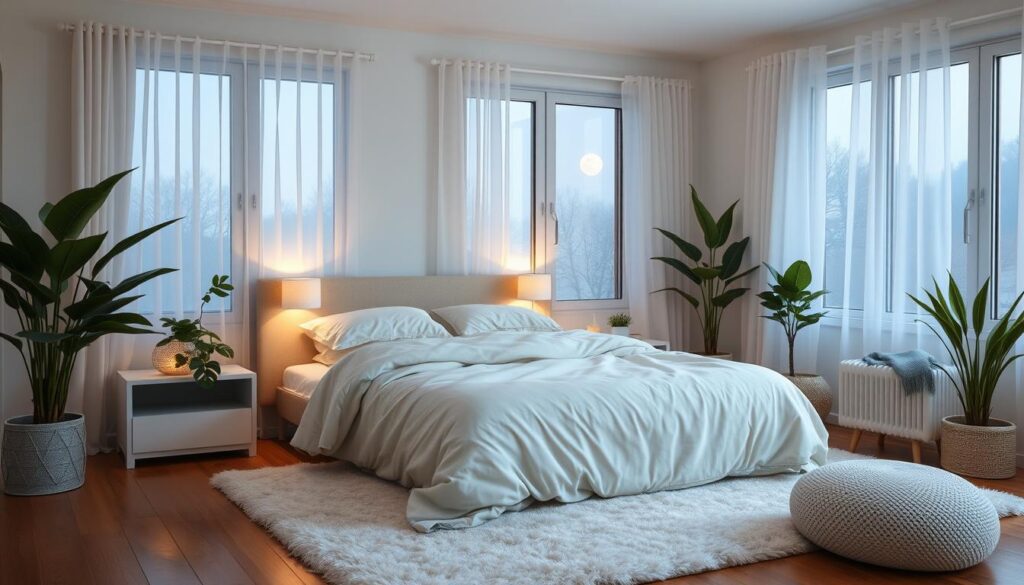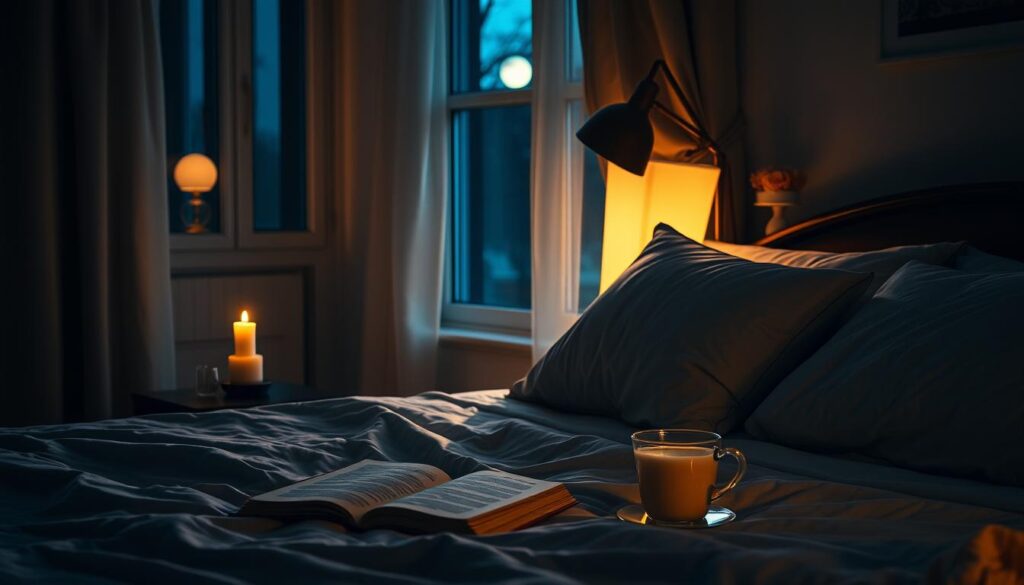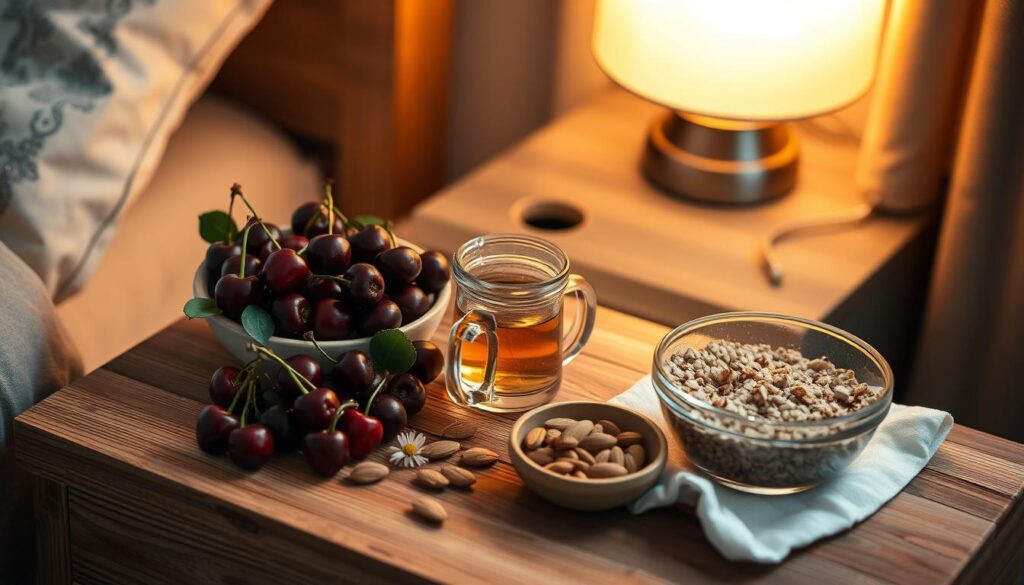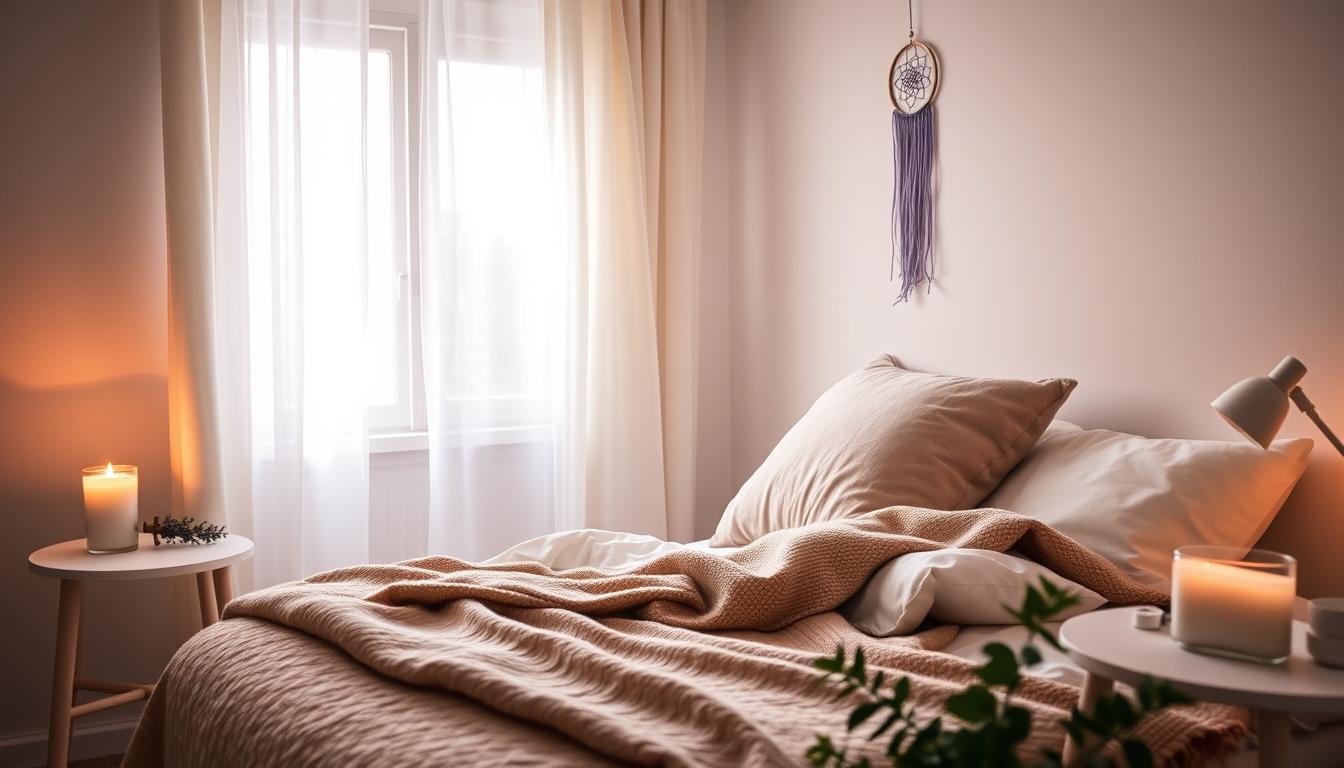Getting quality sleep is key to our health and happiness. But, many of us find it hard to get enough rest. It could be because of daily stress, the pull of screens at night, or trouble relaxing.
Don’t worry, we’ve got you covered. We’ll show you how to sleep better and enjoy those sweet dreams you’ve been dreaming of.
Key Takeaways
- Discover the science behind quality sleep and how it impacts our mental and physical health.
- Learn how to create the perfect sleep environment to promote better slumber.
- Explore natural sleep aids and remedies that can help you drift off with ease.
- Understand the role of diet, exercise, and stress management in achieving high-quality sleep.
- Identify common sleep disorders and when to seek professional help.
Understanding the Science Behind Quality Sleep
Sleep is a complex and fascinating process that’s key to our health and happiness. To grasp its importance, we must dive into the science. This includes sleep cycles, the circadian rhythm, and its effects on our mental health.
Sleep Cycles and Brain Activity
Our body goes through different sleep stages at night. These stages, REM and non-REM sleep, are vital for rest and recovery. Non-REM sleep slows down brain activity, helping our body repair. REM sleep, on the other hand, boosts brain activity, aiding in memory, emotions, and thinking.
The Role of Circadian Rhythm
Our sleep-wake cycle is controlled by an internal clock, the circadian rhythm. It’s influenced by sunlight and temperature. When our circadian rhythm is in sync, we sleep better and stay healthy.
How Sleep Affects Mental Health
Sleep and mental health are closely linked. Good sleep is essential for a healthy mind. Poor sleep can lead to depression, anxiety, and brain problems. Better sleep habits, on the other hand, improve our mood, thinking, and life quality.
By understanding sleep science, we can make better choices for our sleep. This supports our health and mental well-being. Using these insights in our daily lives can help us get the restful sleep we need to flourish.
Creating the Perfect Sleep Environment
Making the perfect bedroom environment is key for quality sleep. By improving our sleep hygiene, we can get a great night’s sleep.
Temperature is very important. The best sleep temperature is between 65-70°F (18-21°C). If it’s too hot or cold, it can mess up our sleep.
- Invest in breathable, high-quality bedding that regulates temperature.
- Use a fan or air conditioning to maintain the ideal climate.
- Avoid heavy, insulating fabrics that can trap heat.
Lighting is also key. Bright lights, natural or artificial, can stop melatonin production. A dim room helps us relax and sleep better.
“Darkness is essential for the release of melatonin, a hormone that controls our sleep-wake cycle.” – National Sleep Foundation
Lastly, keep it quiet. A peaceful room improves sleep quality. White noise machines or earplugs can block out loud noises.

The bedroom environment should be a sleep sanctuary. By focusing on these sleep hygiene tips, we can make a space that supports our sleep. This way, we wake up feeling refreshed and ready to go.
Sweet Dreams: Tips for a Good Night’s Sleep
Getting quality sleep is key for our health and happiness. A consistent bedtime routine, relaxation techniques, and a good sleep schedule help us sleep well. Let’s look at some tips for sweet dreams.
Bedtime Routine Essentials
A consistent bedtime routine tells your body it’s time to sleep. Important parts of a good routine include:
- Taking a warm bath or shower to relax your muscles
- Engaging in light stretching or gentle yoga to release tension
- Dimming the lights and limiting screen time to minimize exposure to blue light
- Reading a book or engaging in a calming hobby to distract your mind
- Practicing deep breathing or meditation to calm the mind and body
Relaxation Techniques Before Bed
Adding relaxation techniques to your bedtime routine can greatly improve sleep. Try these techniques to find what works for you:
- Progressive Muscle Relaxation: Tensing and releasing different muscle groups to reduce tension.
- Guided Imagery: Visualizing a peaceful scene to calm your mind.
- Mindfulness Meditation: Focusing on your breath to quiet your mind.
Managing Sleep Schedule
Keeping a consistent sleep schedule is vital for quality sleep. Here are some tips for managing your sleep schedule:
| Tip | Explanation |
|---|---|
| Stick to a Routine | Go to bed and wake up at the same time every day, even on weekends, to reinforce your body’s natural circadian rhythm. |
| Adjust Gradually | If you need to change your sleep schedule, such as when traveling or adjusting to a new work schedule, do so gradually in 15-minute increments to help your body adapt. |
| Limit Naps | Avoid taking long or frequent naps during the day, as they can interfere with your ability to fall asleep at night. |
By following these tips, you’ll improve your sleep quality. You’ll wake up feeling refreshed and ready to go.

Natural Sleep Aids and Remedies
If you’re having trouble sleeping or want better sleep, natural aids and remedies are worth trying. You can find everything from herbal teas to essential oils. These options might help you get the restful sleep you need.
Melatonin is a well-known natural sleep aid. It helps control our body’s sleep cycle. Taking melatonin supplements can improve sleep quality and make falling asleep easier. But, always talk to a doctor before starting melatonin, as it can affect other medicines.
Valerian root is another natural sleep aid, known for centuries to help with sleep. It relaxes the body and helps you fall asleep faster. It’s thought to be very helpful for those who have trouble sleeping due to anxiety.
- Chamomile tea is a calming drink that can help you sleep. It’s known for reducing anxiety and improving sleep.
- Essential oils like lavender and bergamot can also help you relax and sleep better. They work by calming your mind and body.
Remember, natural sleep aids work for some but not everyone. Always check with a doctor, even if you have no health issues or are not on medication. Trying natural options and making lifestyle changes can help you sleep better.
“A good night’s sleep is essential for our physical and mental well-being. Incorporating natural remedies can be a gentle, effective way to optimize your sleep quality.”
The Impact of Diet on Sleep Quality
Our diet greatly affects how well we sleep. What we eat and drink can change how long and restful our sleep is. Knowing how nutrition and sleep are connected helps us make better choices for our health.
Foods That Promote Better Sleep
Some foods help make hormones that help us sleep, like melatonin and serotonin. Foods high in tryptophan, like turkey and nuts, boost these hormones. Magnesium-rich foods, like leafy greens, help relax muscles and reduce stress, making sleep better.
What to Avoid Before Bedtime
Some foods and drinks can mess with our sleep. Avoiding caffeine in coffee and tea a few hours before bed is key. Alcohol might make us sleepy at first, but it can disrupt sleep later.
Timing Your Last Meal
When we eat our last meal of the day matters too. Try to finish eating two to three hours before bed. This lets our body digest food instead of trying to sleep. Eating too much late can make us uncomfortable and disrupt sleep.
Being careful with what we eat and when can improve our sleep. This way, we can enjoy a good night’s rest.

Technology and Sleep: Finding the Balance
In today’s world, technology affects our sleep a lot. Smartphones and other devices can keep us awake. They make it hard to sleep well.
Blue light from screens is a big problem. It stops our body from making melatonin, which helps us sleep. This can make it tough to fall asleep and reduce how well we sleep.
- Reducing screen time before bed is key for better sleep.
- Apps and devices that block blue light can help our sleep.
- A bedtime routine without tech helps our body get ready for sleep.
But technology can also help us sleep better. Sleep apps give us insights into our sleep. There are also apps and online tools for relaxation and sleep.
| Measure | Impact on Sleep |
|---|---|
| Screen Time | Disrupts natural sleep-wake cycle due to blue light exposure |
| Blue Light Exposure | Suppresses melatonin production, making it harder to fall asleep |
| Bedtime Routine | Establishes cues that promote better sleep quality |
| Sleep Tracking Apps | Provides insights to identify and address sleep issues |
| Relaxation Apps | Aids in promoting better sleep through guided practices |
Knowing how tech affects our sleep helps us find a balance. This balance lets us enjoy tech and sleep well. Good sleep is key to our health, and managing tech is important for it.
“The key is to find a balance between the convenience and benefits of technology and the importance of quality sleep.”
Exercise and Physical Activity for Better Sleep
Regular exercise can help you sleep better. The right exercises can improve your sleep and make you feel refreshed. Let’s look at the best times to exercise and which exercises are best for sleep.
Best Time for Working Out
When you exercise can affect how well you sleep. The best time is late afternoon or early evening, 4-6 hours before bed. This helps your body temperature rise and then fall, signaling it’s time to sleep.
Types of Exercise for Sleep Enhancement
Not all exercises are good for sleep. Some are better than others. Here are some top choices:
- Yoga – It combines gentle movements, deep breathing, and meditation. This calms the mind and body, making it easier to sleep.
- Tai Chi – It uses slow movements and mindfulness. This promotes relaxation and better sleep.
- Low-impact Aerobics – Activities like walking or swimming tire the body without overstimulating the mind. This leads to better sleep.
Adding these exercises to your routine, in the late afternoon or early evening, can greatly improve your sleep. Consistency is key for the best results.
| Exercise Type | Impact on Sleep | Recommended Timing |
|---|---|---|
| Yoga | Promotes relaxation and calmness | Late afternoon or early evening |
| Tai Chi | Enhances mindfulness and stress relief | Late afternoon or early evening |
| Low-impact Aerobics | Tires the body without overstimulating the mind | Late afternoon or early evening |
“Regular exercise can be a game-changer for your sleep quality. By incorporating the right types of physical activity at the optimal time, you can unlock the restorative power of a good night’s rest.”
Managing Stress for Peaceful Nights
In our fast-paced world, stress is a constant for many. It can greatly affect our sleep quality. Learning to manage stress can lead to more peaceful nights.
Journaling is a powerful way to reduce stress and improve sleep. Writing down our thoughts and worries helps us process emotions. It brings clarity and lets go of the day’s tensions. A nightly journaling practice can greatly improve our well-being.
Mindfulness is another tool for better sleep. It helps us stay present and calm our minds. A few minutes of quiet reflection before bed can greatly improve our sleep quality.
Using time management strategies also helps. Prioritizing tasks and setting realistic goals can reduce stress. Learning to say no helps us feel more in control and less overwhelmed.
Addressing the root causes of stress is key for better sleep. By using these techniques, we can enjoy peaceful nights and wake up feeling refreshed.
“The greatest weapon against stress is our ability to choose one thought over another.” – William James
Common Sleep Disorders and Warning Signs
Getting good sleep is key, but some disorders can make it hard. Insomnia makes it tough to fall or stay asleep. Sleep apnea, where breathing stops and starts, also affects sleep quality.
Identifying Sleep Problems
Spotting the signs of sleep disorders is the first step. Feeling tired all the time, being sleepy during the day, and trouble focusing might mean a sleep issue. Loud snoring, waking up a lot, and gasping for air at night could point to sleep apnea.
When to Seek Professional Help
If we can’t sleep well, it’s time to see a doctor. A sleep check can find out why we’re not sleeping right. It might mean changing our sleep space or trying treatments. A specialist can help us get the sleep we need.



